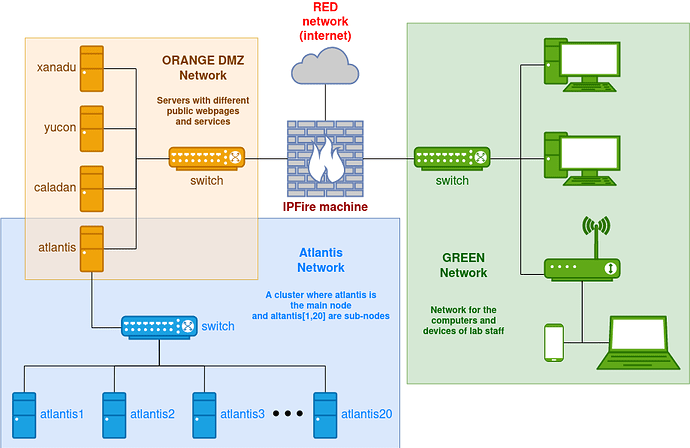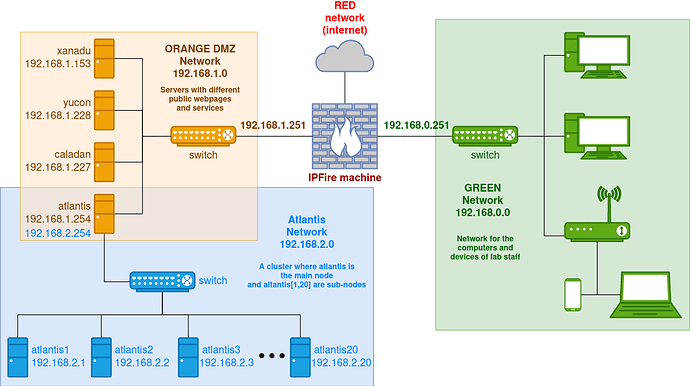No, atlantis is not running IPFire but CentOS 7.
And I did some tests and I can’t access computers on ORANGE using the registered domain, but I can by using it’s explicit IP
For example, Yukon (192.168.2.228) is available externally in let’s say yukon.uni.edu via an IP alias at IPFire and then a NAT rerouting rule (like all other devices in orange net.
This is what happens when I try to ping them from an atlantis device:
user@atlantis7:~$ ping 192.168.1.228 -c 4
PING 192.168.1.228 (192.168.1.228) 56(84) bytes of data.
64 bytes from 192.168.1.228: icmp_seq=1 ttl=63 time=0.396 ms
64 bytes from 192.168.1.228: icmp_seq=2 ttl=63 time=0.413 ms
64 bytes from 192.168.1.228: icmp_seq=3 ttl=63 time=0.408 ms
64 bytes from 192.168.1.228: icmp_seq=4 ttl=63 time=0.409 ms
--- 192.168.1.228 ping statistics ---
4 packets transmitted, 4 received, 0% packet loss, time 3052ms
rtt min/avg/max/mdev = 0.396/0.406/0.413/0.006 ms
user@atlantis7:~$ ping yukon.uni.edu -c 4
PING yukon.uni.edu ('yukon public IP') 56(84) bytes of data.
64 bytes from yukon.uni.edu ('yukon public IP': icmp_seq=1 ttl=63 time=0.488 ms
64 bytes from yukon.uni.edu ('yukon public IP'): icmp_seq=2 ttl=63 time=0.456 ms
64 bytes from yukon.uni.edu ('yukon public IP'): icmp_seq=3 ttl=63 time=0.457 ms
64 bytes from yukon.uni.edu ('yukon public IP'): icmp_seq=4 ttl=63 time=0.446 ms
--- yukon.uni.edu ping statistics ---
4 packets transmitted, 4 received, 0% packet loss, time 3053ms
rtt min/avg/max/mdev = 0.446/0.461/0.488/0.015 ms
But when I try to access anything using the public domain it times out. Only using the explicit IP it works.
Here I try to make an HTTP request to the webserver in yukon with curl using both the explicit IP and the public domain:
user@atlantis7:~$ curl -I yukon.uni.edu
curl: (28) Failed to connect to yukon.uni.edu port 80: Connection timed out
user@atlantis7:~$ curl -I 192.168.1.228
HTTP/1.1 200 OK
Date: Thu, 08 Dec 2022 20:49:10 GMT
Server: Apache/2.4.54 (Debian)
Last-Modified: Mon, 21 Nov 2022 23:31:31 GMT
ETag: "29d5-5ee03748a6bf5"
Accept-Ranges: bytes
Content-Length: 10709
Vary: Accept-Encoding
Content-Type: text/html
Or trying to get SSH access on it:
user@atlantis7:~$ ssh user@yukon.uni.edu
ssh: connect to host yukon.uni.edu port 22: Connection timed out
user@atlantis7:~$ ssh user@192.168.2.228
user@192.168.1.228's password:
Also, when I use a web browser on any atlantis station to access the orange webpages, pages load slowly and sometimes incomplete
And for good measure, this is the traceroute between atlantis7 and yukon:
user@atlantis7:~$ traceroute 192.168.1.228
traceroute to 192.168.1.228 (192.168.1.228), 30 hops max, 60 byte packets
1 atlantis (192.168.2.254) 0.282 ms 0.232 ms 0.215 ms
2 192.168.1.228 (192.168.1.228) 0.412 ms 0.393 ms 0.378 ms
user@atlantis7:~$ traceroute yukon.uni.edu
traceroute to yukon.uni.edu ('yukon public IP'), 30 hops max, 60 byte packets
1 atlantis (192.168.2.254) 0.291 ms 0.231 ms 0.211 ms
2 yukon.uni.edu ('yukon public IP') 0.396 ms !H 0.371 ms !H 0.354 ms !H

